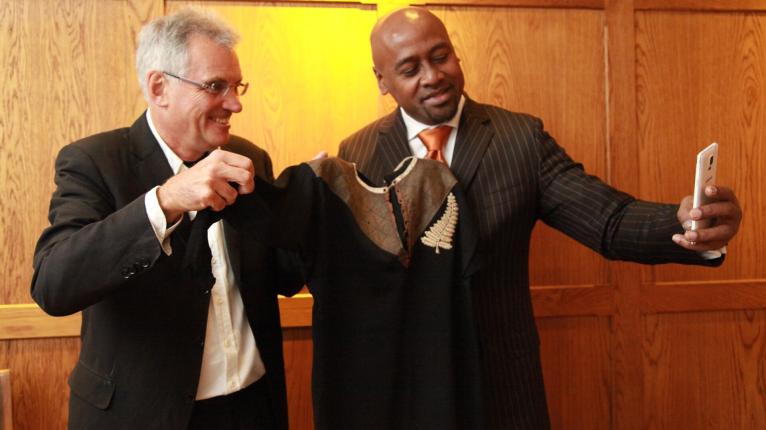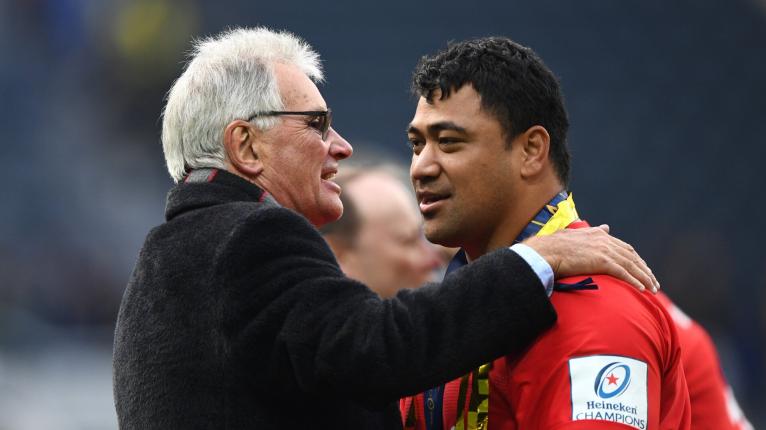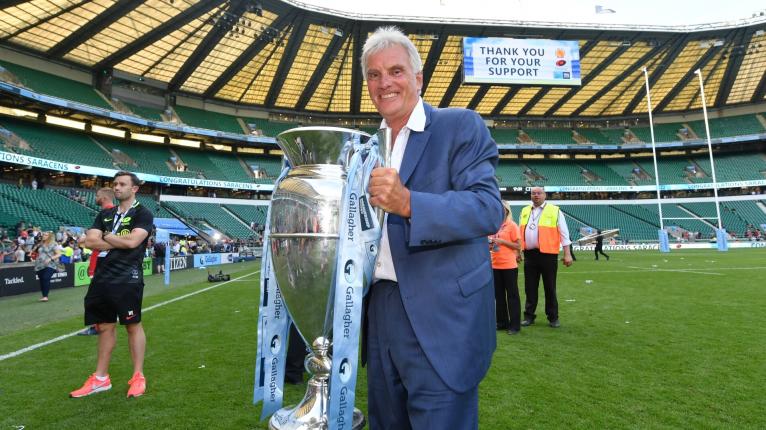In defence of Nigel Wray

In a guest opinion piece, Jonathan Beardmore of the Egg Chasers Podcast comes to the defence of Saracens chairman Nigel Wray.
Nigel Wray is not just an important rugby man, but a great one.
For a quarter of a century he has been at the heart of Saracens, an organisation that has mounted the summits of both domestic and European rugby.
However, one suspects he might not be remembered for these achievements.
Wray brought the world’s biggest names to the English game, men like the colossal French captain Abdel Benazzi and World Cup heroes like Francois Pienaar and Tim Horan.
Saracens, the club he built into the professional era, has developed some of England rugby’s brightest and best. Despite this, Wray’s legacy might end as being regarded as the English game’s biggest cheat.
Earlier this week Premier Rugby handed down an unprecedented 35 point reduction alongside a fine totalling over £5million – one of the biggest fines in the history of British sports.
No doubt this fine, along with most financial burdens Saracens encounter, will be shouldered by Wray. As hard as people have tried, professional rugby clubs just don’t make money and Saracens are no different. The irony is, it is the actions of people like Wray that have contributed to professional rugby being seen by many as unsustainable.
Saracens’ biggest worry should not be point deductions or fines but the prospect of their owner and chief benefactor walking away.

The crime, as has now been well-documented, was Wray co-investing with senior players into limited companies. A process that is perfectly legal but also in direct contravention of the more than 50 pages of the salary cap agreement Saracens sign up to every year.
For those baying for more blood, you might just get what you wish for as legal action from other clubs seems to be in the offing.
But once the dust has settled there may be a way back for Wray. Johan Ackermann, the outstanding Gloucester head coach, was banned for using steroids as a player. He is completely open about his mistake and a shining example of how to make good on past mistakes. Also what of the man at the helm of rugby’s last great scandal, Bloodgate, Dean Richards? Bloodgate rocked rugby to its core yet only 18 months ago Richards was one of the most lauded Directors of Rugby in the land.

Rugby is a harsh, demanding and brutal sport but it is also very forgiving at times. The road to redemption is long and painful but it is available for those willing to take it. A useful start would be to contextualize Wray’s alleged crimes. In its most severe guise Wray has cheated his way to the top, robbed others from life-changing victories, revelled in stolen valour and most importantly compromised the integrity of the game he so clearly loves. On the other hand, this form of cheating is somehow less offensive than the only comparable scandal, Bloodgate.
What happened at Harlequins was blunt and blatant. It required the type of callousness one would need to steal another’s life savings. It was the product of rotten values.
That’s not to say Wray’s cheating has no losers. Exeter Chiefs will tell you exactly the cost. Wray’s actions have consequences that are hard to comprehend. Bloodgate failed to influence a single game but Wray may have manipulated almost half a decade of domestic rugby. There are hidden costs to this behaviour like player wage inflation. Rival clubs offered good deals to players, only to have them bafflingly rebuffed and go to Saracens for less money. In order to keep key squad members, eye-watering deals had to be tabled and tough decisions had to be made, a point starkly made by a number of Harlequins this week.

For all the wrongdoing, you could not point the finger of self-enrichment at Wray. He has never got rich from rugby, indeed, been part of rugby has cost him a small fortune, its cost many owners a small fortune. Wray’s crime was a crime of passion, a man wrapped up in an organisation. He spent substantial sums of his children’s inheritance propping up not only a rugby club but local schools, charities and, yes, helping his players, as he would see it, set up in the world of business.
Why Wray thought this might be a good idea only he knows. Frankly, most of what Saracens have built would still be in existence – the academy, the coaching, a new stadium, a league-leading community programme and yes, outstanding player welfare.

The biggest tragedy is 99 per cent of his achievements could have been met without breaking any cap.
How should rugby react? The complex answer is that sadly even good people do bad things. Saracens should pay the fine and accept the points deduction but Rugby as a sport needs to behave proportionally. Gloucester’s gesture of stopping the sale of Wolfpack lager this weekend is a bell-weather for how strongly fans feel. Wolfpack is one company set up by ex-Saracen captain Ali Hargreaves and Winger Chris Whyles and is a premium example of players transitioning from the game into the real world using exactly the entrepreneurial spirit Saracens and Wray wish to encourage. Chris Whyles was a USA international who made it the hard way, signing from Nottingham Rugby Club. Ali Hargreaves retired after suffering multiple concussions playing the sport we love. Is it these guys we wish to make an example of?
In a similar vein Saracens attracted lots of new eyeballs to the game, many of whom where children encouraged to the games via generous offers to local schools (probably at the expense of Wray). They will be feeling as let down anyone so make sure they feel welcome when they come to Sandy Park or Kingston Park. If I know rugby, I have a feeling the after a good deal of mocking and yes “bantz” the good folk up and down the Premiership will do just that.
“We accept the hate we are going to get, but we think it is misplaced and misguided,” said the Saracens DoR.https://t.co/uFARLmsL6g
— RugbyPass (@RugbyPass) November 9, 2019
I am strongly in favour of a salary cap. I am of the harsh sporting sanctions bought down on Saracens, yet somehow I can’t get as outraged as I know I should be. The accusation of Wary giving away some of his wealth so that the great players of this generation can get a little bit more financial security just does not make my blood boil.
Let’s not abandon our principles in search of punitive punishment. Even good men do bad things and for all his sins, Nigel Wray remains a great rugby man.










































Comments on RugbyPass
Billy's been playing consistently well for 2 - 3 seasons now and deserves a look in at the top level. Ioane and ALB are still first choice but there needs to be injury cover and succession. His partnership with Jordie gives him first dibs you'd think. Go the Hurricanes.
3 Go to commentsIt’s not up to Wales to support Georgian Rugby. That’s up to International Rugby and Georgia. I sympathise with Georgia’s decent attempt to create this fixture. But for Wales the proposed match up is just a potential stick to beat them with and a potential big psychological blow that young Welsh team doesn’t need. (I’m Irish BTW.)
2 Go to commentsCale certainly looks great in space, but as you say, he has struggled in contact. At 23 years old, turning 24 this year, he should be close to full physical maturity and yet there exists a considerable gap in the power and physicality required for international rugby. Weight doesn’t automatically equate to power and physicality either. Can he go from a player who’s being physically dominated in Super rugby to physically dominating in international rugby in 1 or 2 years? That’s a big ask but he may end up being a late bloomer.
28 Go to commentsIf rugby wants to remain interesting in the AI era then it will need to work on changing the rules. AI will reduce the tactical advantage of smart game plans, will neutralize primary attacking weapons, and will move rugby from a being a game of inches to a game of millimetres. It will be about sheer athleticism and technique,about avoiding mistakes, and about referees. Many fans will find that boring. The answer is to add creative degrees of freedom to the game. The 50-22 is an example. But we can have fun inventing others, like the right to add more players for X minutes per game, or the equivalent of the 2-point conversion in American football, the ability to call a 12-player scrum, etc. Not saying these are great ideas, but making the point that the more of these alternatives you allow, the less AI will be able to lock down high-probability strategies. This is not because AI does not have the compute power, but because it has more choices and has less data, or less-specific data. That will take time and debate, but big, positive and immediate impact could be in the area of ref/TMO assistance. The technology is easily good enough today to detect forward passes, not-straight lineouts, offside at breakdown/scrum/lineout, obstruction, early/late tackles, and a lot of other things. WR should be ultra aggressive in doing this, as it will really help in an area in which the game is really struggling. In the long run there needs to be substantial creativity applied to the rules. Without that AI (along with all of the pro innovations) will turn rugby into a bash fest.
24 Go to commentsSouth Africa rarely play Ireland and France on these tours. Mostly, England, Scotland and Wales. I wonder why
1 Go to commentsIt was a let’s-see-what-you're-made-of type of a game. The Bulls do look good when the opposition allows them to, but Munster shut them down, and they could not find a way through. Jake should be very worried about their chances in the competition.
2 Go to commentsHats off to Fabian for a very impressive journey to date. Is it as ‘uniquely unlikely’ as Rugby Pass suggests, given Anton Segner’s journey at the Blues?
1 Go to commentsSad that this was not confirmed. When administrators talk about expanding the game they evidently don’t include pathways to the top tier of rugby for teams outside of the old boys club. Rugby deserves better, and certainly Georgia does.
2 Go to commentsLions might take him on if they move on Van Rooyen but I doubt he will want to go back, might consider it a step backwards for himself. Sharks would take him on but if Plumtree goes on to win the challenge cup they will keep him on. Also sharks showing some promising signs recently. Stormers and Bulls are stable and Springboks are already filled up. Quality coach though, interesting to see where he ends up
1 Go to commentsAnd the person responsible for creating a culture of accountability is?
3 Go to commentsMore useless words from Ben Smith -Please get another team to write about. SA really dont need your input, it suck anyway.
264 Go to commentsThis disgraceful episode must result in management and coach team sackings. A new manager with worse results than previous and the coaching staff need to coached. Awful massacre led by donkeys.
1 Go to commentsInteresting article with one glaring mistake. This sentence: “And between the top four nations right now, Ireland, France, South Africa, and New Zealand…” should read: And between the top four nations right now, South Africa, Ireland, New Zealand and France…”. Get it right wistful thinkers, its not that hard.
24 Go to commentsHow did Penny get the gig anyway?
3 Go to commentsNice write up Nick and I would have agreed a week ago. However as you would know Cale & co got absolutely monstered by the Blues back row of Sotutu, Ioane and Papaliti and not all of these 3 are guaranteed a start in the Black jumper. He may need to put some kgs before stepping up, Spring tour? After the week end Joe will be a bit more restless. Will need to pick a mobile tough pack for Wales and hope England does the right thing and bashes the ABs. I like your last paragraph but I would bring Swinton, Hannigan into the 6 role and Bobby V to 8
28 Go to commentsThe Crusaders can still get in to the Play Off’s. The imminent return of outstanding captain Scott Barrett and his All Black team mate Codie Taylor will be a big boost.There are others like Tamaiti Williams too. Two home games coming up. Fellow Crusader fans get there and support these guys. I will be.
2 Go to commentsCant get more Wellington than Proctor.
3 Go to commentsWhy not let the media decide. Like how they choose the head coach. Like most of us we entrust the rugby system to choose. A rugby team includes the coaches. It's collective.
14 Go to commentsHi NIck, I have been very impressed with him and he seems a smart player who can see opportunities which Bobby V _(who must be an international 6_) doesn’t see or have the speed to take advantage of. If he continues to improve and puts on 5kgs then he could be a great 8. He is a bit taller than Keiran Reid at 1.93m and 111 kgs, so his skill set fits his body size and who knows where it will lead. I hope the spate of Achilles tendon issues have been dealt with by the S&C people. It’s been a very long time since Mark Loane and Kefu stood out at 8. The question is will we be able to hold onto him, if he does make it he will be pretty hot property. I disagree with the idea of letting them go to the Northern Hemisphere and then bring them back.
28 Go to commentsBilly Fulton 🤣🤣🤣🤣 garrrmon not even close
14 Go to comments